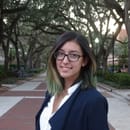When University of Florida students woke up on Thursday, Oct. 19, a common thought was “I hope this doesn’t end like Charlottesville.”
The events in Charlottesville, Va., occurred only two months prior to Richard Spencer, an “alt-right” white supremacist, arriving in Gainesville. Only two months. People hadn’t forgotten the injuries and deaths that were a result or the man who spoke at the Unite the Right rally behind it all.
After Charlottesville, Spencer chose to speak in Gainesville. The University of Florida denied his first request but couldn’t deny him forever because it is a public university. As UF President W. Kent Fuchs told CNN, public universities are “actors of the government” and obligated by the First Amendment to protect the right to free speech. Even people who protested the event said that UF did the best they could to keep hate speech off campus.
Laura Batero, a first year student at the university, said that UF handled as much as they could but that the reported $500,000 taxpayers spent on security may have been too much. The presence of Spencer and his supporters put students and everyone in Gainesville in danger, she said.
Senior tourism, recreation and events management major Taylor Petry said, “I hope he’ll never come back, and I hope people with those ideas might’ve been discouraged from coming.”
With hundreds of protestors outside of the Curtis M. Phillips Center for the Performing Arts, only a select few were allowed inside to watch the speech. People were turned away for items such as notebooks, scarves, cameras and “anything that could be used as a projectile,” some state troopers said. Others were denied entrance for indiscernible reasons. (Full disclosure: this reporter was denied entry by a man dressed in a white button-up shirt and khaki pants—not by the state troopers. An explanation was not given.)
Tensions ran high. Supporters that exited the Phillips Center were surrounded by protesters chanting “no Trump, no KKK, no fascist USA.” At various times, some protesters in the crowd called for violence but were quickly shot down by surrounding participants.
While many of the participants were Gainesville residents and students, news of the protest (originally named No Nazis at UF) reached other parts of Florida. Erik Wekerle traveled about two and a half hours from Clearwater, Fla.
“My grandfather flew to Europe to deal with Nazis,” Wekerle said. “I might as well come here to greet them myself.”
Inside the Phillips Center, protesters also stood and booed against Richard Spencer. According to reporters inside, the speaker was shut down as people yelled and chanted things such as “Black Lives Matter.”
Protesters lingered for a while after the official end of the event as supporters left the Phillips Center. Some had to be escorted by law enforcement through the crowd. As a video posted on the Her Campus twitter showed, two supporters were surrounded on all sides by state troopers. The troopers had their hands on the troopers in front of them to create a blockade from the crowd that pushed in.
According to a joint press release posted by UF Public Safety, the event and protest ended with “minimal violence” and two arrests. The press release also reported the amount of demonstrators as more than 2,500.
Some people were of the opinion that the protesters embarrassed themselves. The demonstrators, however, had their reasons for being present—and those that were willing to talk expressed a belief in standing against hate speech and the effects of doing so.
Gabriela Pineros, a first-year political science major, said, “I can’t change their minds, but I’m possibly changing the minds of people he’d recruit.”


